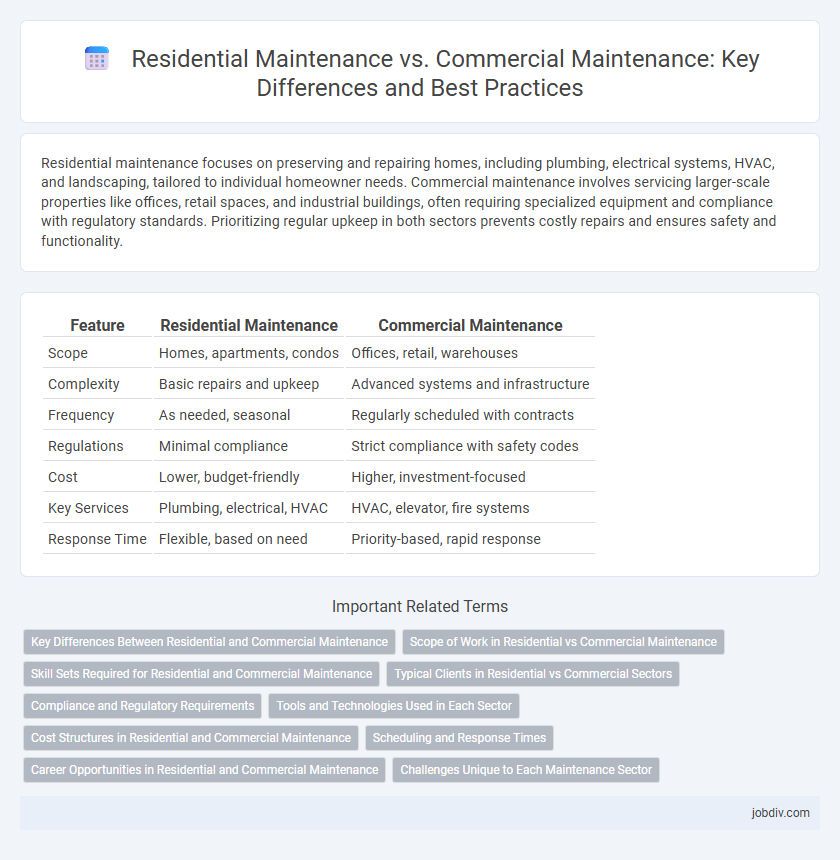Residential maintenance focuses on preserving and repairing homes, including plumbing, electrical systems, HVAC, and landscaping, tailored to individual homeowner needs. Commercial maintenance involves servicing larger-scale properties like offices, retail spaces, and industrial buildings, often requiring specialized equipment and compliance with regulatory standards. Prioritizing regular upkeep in both sectors prevents costly repairs and ensures safety and functionality.
Table of Comparison
| Feature | Residential Maintenance | Commercial Maintenance |
|---|---|---|
| Scope | Homes, apartments, condos | Offices, retail, warehouses |
| Complexity | Basic repairs and upkeep | Advanced systems and infrastructure |
| Frequency | As needed, seasonal | Regularly scheduled with contracts |
| Regulations | Minimal compliance | Strict compliance with safety codes |
| Cost | Lower, budget-friendly | Higher, investment-focused |
| Key Services | Plumbing, electrical, HVAC | HVAC, elevator, fire systems |
| Response Time | Flexible, based on need | Priority-based, rapid response |
Key Differences Between Residential and Commercial Maintenance
Residential maintenance primarily involves routine tasks like cleaning, landscaping, and small repairs to ensure a comfortable living environment, while commercial maintenance requires managing larger-scale systems such as HVAC, elevators, and safety compliance. Commercial properties often demand specialized services, including preventive maintenance and adherence to regulatory standards like OSHA, which are less common in residential settings. Budget allocation and maintenance schedules also differ significantly, with commercial maintenance focusing on minimizing downtime and operational disruptions.
Scope of Work in Residential vs Commercial Maintenance
Residential maintenance primarily involves routine tasks such as HVAC servicing, plumbing repairs, electrical inspections, and landscaping to ensure the safety and comfort of occupants in single-family homes or multi-family units. Commercial maintenance encompasses a broader and more complex scope, including preventive maintenance of HVAC systems, elevator servicing, fire safety compliance, structural repairs, and janitorial services in office buildings, retail spaces, and industrial facilities. The commercial sector demands specialized equipment and compliance with stricter regulations, often requiring dedicated maintenance teams to manage multiple systems and ensure minimal disruption to business operations.
Skill Sets Required for Residential and Commercial Maintenance
Residential maintenance requires skills in basic plumbing, electrical repairs, HVAC troubleshooting, and carpentry, emphasizing quick problem-solving and personalized service tailored to individual homes. Commercial maintenance demands expertise in managing complex systems, including industrial HVAC units, advanced electrical infrastructure, safety compliance, and large-scale preventive maintenance protocols to support business operations. Proficiency in regulatory standards, facility management software, and coordination with specialized contractors is essential for commercial maintenance professionals.
Typical Clients in Residential vs Commercial Sectors
Typical clients in residential maintenance include homeowners, landlords, and property managers focused on upkeep of single-family homes, apartments, and condominiums. Commercial maintenance clients primarily consist of business owners, facility managers, and commercial property management firms responsible for office buildings, retail stores, and industrial facilities. The scale and complexity of maintenance demands vary significantly between residential and commercial clients, with commercial sectors requiring more specialized services and compliance with regulatory standards.
Compliance and Regulatory Requirements
Residential maintenance primarily involves adhering to local housing codes and safety standards designed to protect occupants, such as fire safety regulations and lead paint disclosures. Commercial maintenance must comply with more complex regulatory frameworks, including OSHA standards, ADA accessibility requirements, and environmental laws that govern workplace safety and operational permits. Ensuring compliance in commercial settings often requires specialized inspections and certifications to avoid fines and maintain business operations.
Tools and Technologies Used in Each Sector
Residential maintenance primarily utilizes handheld tools such as hammers, screwdrivers, and portable power drills, along with smart home devices like thermostats and security systems for efficient management. Commercial maintenance employs advanced machinery and diagnostic technologies including HVAC systems, industrial-grade cleaning equipment, and Building Management Systems (BMS) to handle larger-scale infrastructure. Both sectors increasingly integrate IoT sensors and predictive maintenance software to optimize repair schedules and reduce downtime.
Cost Structures in Residential and Commercial Maintenance
Residential maintenance costs typically involve lower fixed expenses but higher variability due to individual homeowner preferences and smaller-scale repairs. Commercial maintenance features more complex cost structures with predictable fixed costs and budget allocations tied to large assets, regulatory compliance, and frequent preventative services. Understanding these distinctions helps optimize budgeting strategies for property managers and business owners.
Scheduling and Response Times
Residential maintenance typically offers flexible scheduling options to accommodate homeowners' availability, with response times usually ranging from a few hours to a couple of days. Commercial maintenance prioritizes rapid response times, often within one to two hours, due to the critical nature of business operations and the need to minimize downtime. Efficient scheduling in commercial settings involves coordinated service windows to reduce disruption and comply with operational hours.
Career Opportunities in Residential and Commercial Maintenance
Career opportunities in residential maintenance typically involve tasks such as plumbing, electrical work, HVAC repairs, and general handyman services tailored to individual homes and apartment complexes. Commercial maintenance careers focus on managing larger-scale systems, including industrial equipment, building automation, safety compliance, and facility management within office buildings, retail centers, and manufacturing plants. Both sectors demand skilled technicians and offer pathways for specialization, certification, and advancement into supervisory or project management roles.
Challenges Unique to Each Maintenance Sector
Residential maintenance faces challenges like managing diverse home systems, ensuring tenant satisfaction, and adhering to local housing codes. Commercial maintenance demands handling complex HVAC and electrical systems, minimizing downtime to avoid business disruptions, and complying with stricter regulatory standards. Both sectors require specialized strategies to address their unique operational, safety, and budgetary constraints effectively.
Residential Maintenance vs Commercial Maintenance Infographic

 jobdiv.com
jobdiv.com